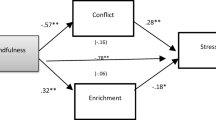Abstract
Empathy is desirable in all health care professionals in their interactions with patients and each other. Empathy in its cognitive (perspective-taking) and affective forms has been well-studied in the literature and in fact, is shown in most studies to decline during undergraduate and graduate medical education. Empathy has also been shown to be inversely proportional to one’s sense of power (SOP) in the business literature. In addition, the relationship of empathy to personality traits has not been examined. This cross-sectional study of four cohorts of undergraduate medical students at a private mid-Atlantic medical school compares the empathy of first, second, third and fourth year medical students to see if there is a decline across the medical school experience. It also examines the relationship among empathy, SOP and personality type across the 4 years of medical school. Unlike in many previous studies, we found no decline in student empathy. We found no significant relationship between SOP and empathy. Finally, there were no significant differences in power perception and personality measures across all educational years surveyed.
Similar content being viewed by others
References
AAMC. Recommendations for clinical skills curricula for undergraduate medical education. Clinical Practice Competencies 2005:11–3.
ACGME outcome project. 1999 [cited 2010 Jun 9]. Available from: URL: http://www.acgme.org/outcome/comp/compmin.asp.
Allen, D., Wainwright, M., Mount, B., & Hutchinson, T. (2008). The wounding path to becoming healers: Medical students’ apprenticeship experiences. Medical Teacher, 30(3), 260–264.
Anderson, C., & Galinsky, A. D. (2006). Power, optimism, and risk taking. European Journal of Social Psychology, 36, 511–536.
Batt-Rawden, S. A., Chisolm, M. S., Anton, B., & Flickinger, T. E. (2013). Teaching empathy to medical students: An updated systematic review. Academic Medicine, 88, 1171–1177.
Chen, D., Lew, R., Hershman, W., & Orlander, J. (2007). A cross-sectional measurement of medical student empathy. Journal of General Internal Medicine, 22(10), 1434–1438.
Chibnall, J. T., Blaskiewicz, R. J., & Detrick, P. (2009). Are medical students agreeable? An exploration of personality in relation to clinical skills training. Medical Teacher, 31(7), 311–315.
Colliver, J. A., Conlee, M. J., Verhulst, S. J., & Dorsey, J. K. (2010). Reports of the decline of empathy during medical education are greatly exaggerated: A reexamination of the research. Academic Medicine, 85(4), 588–593.
Davis, M. H. (1980). A multidimensional approach to individual differences in empathy. JSAS Catalog of Selected Documents in Psychology, 10, 85.
Del Barrio, V. (2004). Relationship between empathy and the big five personality traits in a sample of Spanish adolescents. Social Behavior & Personality: An International Journal, 32, 677–682.
DiBlasi, Z., Harkness, E., Ernst, E., Georgiou, A., & Kleijnen, J. (2011). Influence of context effects on health outcomes: A systematic review. The Lancet, 357, 757–762.
Galinsky, A. D., Magee, J. C., Inesi, M. E., & Gruenfeld, D. H. (2006). Power and perspectives not taken. Psychological Science, 17(12), 1068–1074.
Garden, R. (2009). Expanding clinical empathy: An activist perspective. Journal of General Internal Medicine, 24(1), 122–125.
Gosling, S. D., Rentfrow, P. J., & Swann, W. B. (2003). A very brief measure of the big-five personality domains. Journal of Research in Personality, 37(6), 504–528.
Guinote, A. (2007). Power and the suppression of unwanted thoughts: Does control over others decrease control over the self? Journal of Experimental Social Psychology, 43, 433–440.
Halpern, J. (2003). What is clinical empathy? Journal of General Internal Medicine, 18, 670–674.
Hojat, M. (2007). Empathy in patient care antecedents, development, measurement and outcomes. New York: Springer.
Hojat, M., Gonnella, J. S., Mangione, S., et al. (2002). Empathy in medical students as related to academic performance, clinical competence, and gender. Medical Education, 36, 522–527.
Hojat, M., Gonnella, J. S., & Veloski, J. (2010). Author reply. Academic Medicine, 85(12), 1813–1814.
Hojat, M., Vergare, M. J., Maxwell, K., et al. (2009). The devil is in the third year: A longitudinal study of erosion of empathy in medical school. Academic Medicine, 84(9), 1182–1191.
Marteau, T. M., Humphrey, C., Matoon, G., Kidd, J., Lloyd, M., & Horder, J. (1991). Factors influencing the communication skills of first-year clinical medical students. Medical Education, 25(2), 127–134.
Munro, D., Bore, M., & Powis, D. (2005). Personality factors in professional ethical behaviour: Studies of empathy and narcissism. Australian Journal of Psychology, 57(1), 49–60.
Neumann, M., Edelhauser, F., Tauschel, D., et al. (2011). Empathy decline and its reasons: A systematic review of studies with medical students and residents. Academic Medicine, 86(8), 996–1009.
O’Brien, E., Konrath, S. H., Gruhn, D., & Hagen, A. L. (2012). Empathic concern and perspective-taking: Linear and quadratic effects of age across the adult life span. The Journals of Gerontology Series B: Psychological Sciences and Social Sciences 2012; doi:10.1093/geronb/gbs055.
Quince, T., Parker, R., Wood, D., & Benson, J. (2011). Stability of empathy among undergraduate medical students: A longitudinal study at one UK medical school. BMC Medical Education, 11, 90.
Rider, E. A., & Keefer, C. H. (2006). Communication skills competencies: Definitions and a teaching toolbox. Medical Education, 40, 624–629.
Roh, M. S., Hahm, B. J., Lee, D. H., & Suh, D. H. (2010). Evaluation of empathy among Korean medical students: A cross-sectional study using the Korean version of the Jefferson scale of physician empathy. Teaching and Learning in Medicine, 22(3), 167–171.
Shanafelt, T. D., West, C., Zhao, X., et al. (2005). Relationship between increased personal well-being and enhanced empathy among internal medicine residents. Journal of General Internal Medicine, 20, 559–564.
Stratton, T. D., Saunders, J. A., & Elam, C. L. (2008). Changes in medical students’ emotional intelligence: An exploratory study. Teaching and Learning in Medicine, 20(3), 279–284.
Author information
Authors and Affiliations
Corresponding author
Rights and permissions
About this article
Cite this article
Toto, R.L., Man, L., Blatt, B. et al. Do empathy, perspective-taking, sense of power and personality differ across undergraduate education and are they inter-related?. Adv in Health Sci Educ 20, 23–31 (2015). https://doi.org/10.1007/s10459-014-9502-z
Received:
Accepted:
Published:
Issue Date:
DOI: https://doi.org/10.1007/s10459-014-9502-z




